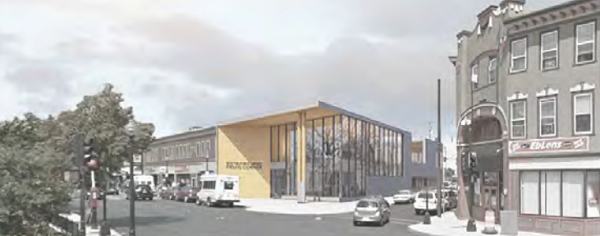April 19, 2023

A rendering of the new Fields Corner library. Courtesy BPL
Near the end of a campaign fundraiser ahead of Election Day in 2021, Michelle Wu turned to a topic that hadn’t drawn the same headlines as her support for a return to rent control and a “Green New Deal” to combat climate change in Boston: Permitting.
City Hall’s process for approving permits is slow and often comes with red tape, Wu said, pointing to building inspectors who were struggling with a backlog. Adding staff should help, she said, and hiring administrators to support the inspectors could quadruple productivity.
The mayor last week proposed a budget that seeks to add staff personnel across multiple departments, including within the Inspectional Services Department and the Registry, which deals with birth, death, and marriage certificates. The proposal also calls for an increase in staff in the city’s supplier diversity office, which is aimed at helping businesses owned by women and people of color access city contracts.
The budget is Wu’s second. It requires the approval of the City Council, which will hold hearings before voting on the bill in June.
“A big focus of our ‘back to basics’ this year is looking at how programs are running and whether they’re fully accessible,” Wu said.
The proposal would add a to-date uncertain number of employees to a City Hall workforce of nearly 20,000 people, but it is otherwise littered with other numbers, including $43 million for new libraries in Codman Square, Fields Corner, and Egleston Square.
The budget also includes $750,000 to expand weekday and Saturday hours at the branch libraries, some of which were on the brink of closure more than 10 years ago before local lawmakers and residents rallied against the moves.
Parking improvements are also on the way, given a budget approval. Meetinghouse Hill’s Coppens Square is in line to receive a new fountain to replace the one removed in 1951, and upgrades are on tap for Clam Point’s Byrne Playground and Fields Corner’s Ronan Park.
The proposal additionally calls for reconstruction of Cummins Highway in Mattapan, and the addition of new ramps to the thoroughfare. It would add a bike lane from Columbia Road in Dorchester to Melnea Cass Blvd. in Roxbury, and extend the median on Hyde Park Avenue at Neponset Avenue and Florian Street.
The mayor has zeroed in on some smaller items, too, such as the installation of a bronze sculpture of books at the Mattapan branch library.
Per the bill, the Boston Housing Authority would receive $1.2 million for violence prevention and public safety staffing, while the police department would add $582,000 to a program in which social workers in police stations can connect youth with services and support. Overall, the Police Department’s budget would increase by $10 million.
Overall, Wu’s operating budget for fiscal year 2024 is put at $4.28 billion, an increase of $238 million, or 7 percent over fiscal year 2023, while the capital plan, spanning fiscal year 2024 to 2028 and covering the cost of the new libraries, comes in at $4.2 billion.
Wu and members of her administration briefed the 13-member City Council on her budget plan last week. The councillors will have another shot at using the enhanced budgetary powers that voters granted them in the 2021 election: They can amend budget line items as long as the total budget amount does not exceed what the mayor proposed.
Last year’s process was a test of that new authority, and the independent Boston Municipal Research Bureau noted that councillors “struggled to make fiscally responsible amendments,” and ended up redistributing just $9.9 million, or roughly 0.6 percent of the appropriations they had the authority to change.
Tania Fernandes Anderson, District 7 councillor for Roxbury and Dorchester, is again helming the Council’s Ways and Means Committee. During Wu’s briefing on the budget last week, Fernandes Anderson said she is working with the administration to streamline the amendment process.
District 3 Councillor Frank Baker, who represents Dorchester, said he welcomed the increase in staffing levels. “We’ve had a lot of people leave in the last couple of years,” he noted.
Baker is looking for the budget to include programs to help city workers buy homes. “That’ll be part of the discussions I think moving forward. What are we doing for the city worker that’s only making 30 or 40 thousand dollars,” he said. “How do we get that person into a stable housing situation?”
Advocates of “participatory budgeting,” a call for greater public involvement in city budget proceedings, said they wished Wu had set aside more money for that process. Voters in 2021 approved a ballot measure that created an Office of Participatory Budgeting, and Wu’s proposed bill sets aside $2 million for the effort.
The Better Budget Alliance, a coalition that includes the Boston Teachers Union, the Boston Cyclists Union, the Dudley Street Neighborhood Initiative, and the Chinese Progressive Association, said that $2 million isn’t enough. The coalition wants $40 million, saying the money could pulled from the Boston Police Department’s $10 million increase and “modest reductions from a broad range” of city departments.
“We envision a new budgeting process that invites neighbors into community assemblies to collectively propose and vote on how to spend a meaningful portion of our tax dollars,” the coalition said in a statement. “Let’s take this opportunity to invest in a more equitable and just Boston, where all Bostonians can have a real impact.”


